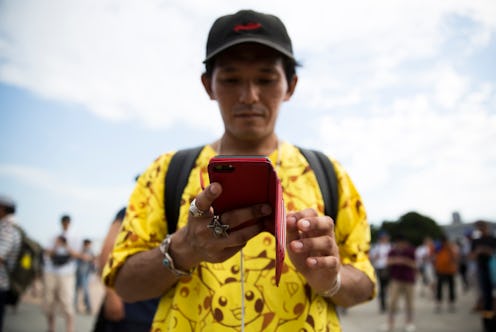News
Russia May Have Used "Pokemon Go" To Sway The 2016 U.S. Election

The list of entities involved with the Russian-linked operation to manipulate U.S. politics just got a surprising addition after Facebook and Twitter. Russian agents reportedly used Pokémon Go to meddle in the 2016 election. A source revealed to CNN that Moscow-linked actors posed as an organization connected to the Black Lives Matter movement, possibly to exploit racial tensions. A pro-Kremlin propaganda arm called Internet Research Agency mostly likely ran the "Don't Shoot Us" campaign, with the potential goal of incensing Americans in an already charged political atmosphere — an atmosphere that could be beneficial for electing Donald Trump for president. Along with using augmented reality game Pokémon Go, members of the campaign also took advantage of Facebook, Instagram, Twitter, YouTube, and Tumblr in their attempts to create disharmony.
The "Don't Shoot Us" campaign's name most likely references the "Hands Up, Don't Shoot" slogan activists use to protest police violence, particularly police brutality toward black men, who are disproportionately more likely to be shot and killed by police. On its Tumblr page, the Don't Shoot Us Campaign announced a contest that asked Pokémon Go users to find and train Pokémon near locations where alleged incidents of police brutality had taken place. The contest rules instructed participants to name their Pokémon after the location's corresponding victims. A post promoting the contest showed a Pokémon named Eric Garner, for the 43-year-old man who died after a New York City police officer put him in a chokehold. The post said winners of the contest would receive Amazon gift cards.
The exact purpose of the contest is unclear, but it may have been to anger people, spurring the real Black Lives Matter movement to protest and encouraging the movement's critics to feel threatened by black activism. Some people have expressed their skepticism on Twitter, however.
Maria Zakharova, a spokesperson for Russia's Ministry of Foreign Affairs, also slammed the Pokémon Go leak. She took to Facebook to say (translated from Russian):
Based on the logic of CNN, African-Americans define their civil positions by playing Pokémon. This is how the TV channel explained the emergence of racial problems in modern America. The Russians are guilty again...
The "Don't Shoot Us" campaign had suspended most of its social media channels by Thursday morning. It's unknown how many users — if any — participated in the contest. Niantic, the makers of Pokémon Go, provided a statement to CNN:
It's clear from the images shared with us by CNN that our game assets were appropriated and misused in promotions by third parties without our permission.
It is important to note that Pokémon Go, as a platform, was not and cannot be used to share information between users in the app so our platform was in no way being used. This "contest" required people to take screen shots from their phone and share over other social networks, not within our game. Niantic will consider our response as we learn more.
While the idea of Pokémon Go swaying the presidential election seems far-fetched, it comes after a string of evidence pointing to Russia's alleged interference and dissemination of fake news via online platforms. The House Intelligence Committee plans to release to the public the Facebook ads purchased by Russian groups, after Facebook helps the committee remove personally identifiable information. A week earlier Facebook revealed the Russian-linked ads specifically targeted swing states like Michigan and Wisconsin, plus demographic groups that could swing the election in Trump's favor. Pinterest became a scrapbook for fake news pins and Twitter suspended more than 200 accounts tied to the Internet Research Agency.
The agency, based in St. Petersburg and known as Russia's "troll army," first came to public attention after Buzzfeed dropped an article based on emails leaked by a Russian hacker collective. The emails reportedly revealed a Kremlin-backed plan to manipulate American public opinion by churning out fake news and trolling on internet forums. Pokémon Go might not have swung the election, but a combination of multiple online operations possibly lent a helping hand.